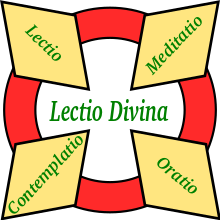 |
| Part of a series on |
| Christian mysticism |
|---|
In Western Christianity, Lectio Divina (Latin for "Divine Reading") is a traditional monastic practice of scriptural reading, meditation and prayer intended to promote communion with God and to increase the knowledge of God's word.[1] In the view of one commentator, it does not treat Scripture as texts to be studied, but as the living word.[2]
Traditionally, Lectio Divina has four separate steps: read; meditate; pray; contemplate. First a passage of Scripture is read, then its meaning is reflected upon. This is followed by prayer and contemplation on the Word of God.[3]
The focus of Lectio Divina is not a theological analysis of biblical passages but viewing them with Christ as the key to their meaning. For example, given Jesus' statement in John 14:27: "Peace I leave with you; my peace I give unto you", an analytical approach would focus on the reason for the statement during the Last Supper, the biblical context, etc. In Lectio Divina, however, the practitioner "enters" and shares the peace of Christ rather than "dissecting" it.[4] In some Christian teachings, this form of meditative prayer is understood as leading to an increased knowledge of Christ.[5]
The roots of scriptural reflection and interpretation go back to Origen in the 3rd century, after whom Ambrose taught them to Augustine of Hippo.[6][7] The monastic practice of Lectio Divina was first established in the 6th century by Benedict of Nursia and was then formalized as a four-step process by the Carthusian monk Guigo II during the 12th century.[3] In the 20th century, the constitution Dei verbum of the Second Vatican Council recommended Lectio Divina to the general public[citation needed][8] and its importance was affirmed by Pope Benedict XVI at the start of the 21st century.
- ^ Thompson, Marjorie J.; Howard, Evan B. (2005-04-19). Soul Feast: An Invitation To The Christian Spiritual Life. Westminster John Knox Press. p. 24. ISBN 9780664229474. Retrieved 24 November 2012.
In Benedictine tradition, spiritual reading is referred to by its Latin title, Lectio Divina. Both Roman Catholics and Protestants owe much of their understanding and practice of scriptural meditation to Benedict. Yet few Protestants are aware that figures like the great Reformer John Calvin and Puritan pastor Richard Baxter advocated a method of reflective meditation with scripture that is directly derived from Benedictine practice. Reformed adaptations of Lectio were common among the Puritans.
- ^ Benner 2010, pp. 47–53.
- ^ a b Cunningham & Egan 1996, p. 38.
- ^ Cite error: The named reference
Foster24was invoked but never defined (see the help page). - ^ Teaching world civilization with joy and enthusiasm by Benjamin Lee Wren 2004 ISBN 0-7618-2747-1 page 236
- ^ Cite error: The named reference
BendictMay2007was invoked but never defined (see the help page). - ^ Cite error: The named reference
FatherBenedictwas invoked but never defined (see the help page). - ^ "Dei Verbum and Lectio Divina - Benedict XVI". Crossroads Initiative. 28 January 2016. Retrieved 22 January 2024.